A time to give back
The school bell rang to indicate that the interval was over. Uniform-clad students scattered all over the corridors rushed to their classrooms while
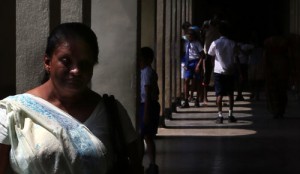
Vice Principal, Kumudini Wickremesiri. Photos by M.A. Pushpa kumara
those in sports attire hit the playground for practices.
Minutes later, only a 10-year-old boy in uniform was seen hovering around in the long corridor. As he went past a group of visually impaired teachers who were sitting in a classroom nearby, one of them called out his name.
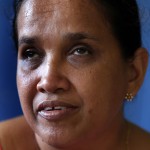
Dhammika Priyadarshani
“Daham, how come you are not in your class?” asked Sharika Rajapaksha, civics teacher at the Ceylon School for the Deaf and Blind, Ratmalana . Much to our amazement, despite her blindness, Sharika managed to identify the student who was idling outside the class.
“It is Daham who generally mimics a car,” explained Sharika adding that as a blind teacher, she closely follows the behavioral pattern of each child so as to differentiate between them.
Like Sharika, there are several visually impaired former students of the Ratmalana School for the Blind who have returned to the school as teachers, determined and totally dedicated to teaching a new generation of visually impaired students achieve the hard-won independence they have gained.
Having courageously broken the barriers of impairment, these student turned teachers at the Ratmalana Blind School said it is personally
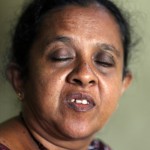
Monica Shiranthi Pieris
rewarding to know that they are able to give back something to their alma mater – which most of them identify as their second home and to improve the conditions of the underprivileged.
Vice Principal, Kumudini Wickremesiri is one of them. She came to the school at the age of six and has been teaching there for the past 28 years. Kumudini recollected vividly, her first day at school as a student; how she was crying hard when her parents left her at the hostel; how she walked around the school with the headmaster to listen
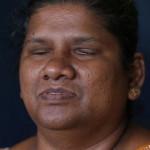
Padmakumari Karunathilleke
to the birdsong; how she fell in love with the environment and asked if she could stay there; the Monday morning assembly and the inspirational words of her teachers.
“I got so much from the school in becoming the independent person I am today. I wanted to give it back to the others,” she said.
Following her graduation, she remained at home for two years teaching English for children until she was invited by a former principal to take up an English teaching post.
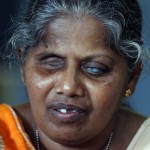
Jenette Silva
Teaching the visually impaired is tough and being a blind teacher is even more challenging, said Kumudini who as Vice Principal has additional responsibility for overall supervision and management of the school.
“When you are teaching the visually impaired, there are certain things you have to be very mindful about, for example, when you give them a word, you have to pronounce that word very clearly out loud as they are unable to read the teacher’s lips and might mispronounce it,” she explained.
“In some instances students who have not attended pre-school enrol at the Blind School. Then you have to teach them the basics before you start the normal curriculum,” Kumudini said adding that she gets assistance from other teachers for other tasks such as marking the register or writing up reports.
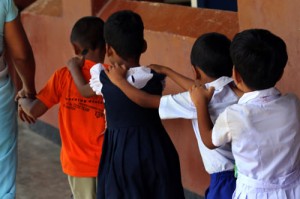 Identifying the students is the most challenging, she says. “Familiarity comes with time once you are able to identify them from their voices or by the way they answer,” she added.
Identifying the students is the most challenging, she says. “Familiarity comes with time once you are able to identify them from their voices or by the way they answer,” she added.
Dhammika Priyadarshani who joined the school in 1977 as a five-year-old, studied up to the Ordinary Level at the Blind School and moved out to pursue higher studies. After graduation, she joined the school as a volunteer and subsequently got a teaching appointment. Sinhala and Buddhism being her subjects, Dhammika said she is extremely happy to have come back to serve the school. “It is like home here; I don’t feel the time passing,” she said.
For Dhammika, discipline is of utmost importance and she has developed her own techniques to deal with the students.
“Although I am blind, I keep a close tab on them. If a student is becoming disorderly in class and becoming a bad influence on the others, I correct the student immediately. I pay attention to their conversations to figure out if they are breaking the rules.
“Once during a lesson, I heard a child from the parallel class bouncing a ball. From the speed with which he was bouncing it, I assumed it could be the partially sighted boy in that class. When I went to that class and called his name, he asked in utter surprise how I knew it was him,” Dhammika recalled.
“If we are in a conversation with a child, if the child’s voice is coming from a higher level, it means that the student has climbed up on the desk. There are the little things to be vigilant about,” she added.
Padmakumari Karunathilleke is the school’s IT teacher. Having enrolled at the school in 1982 at the age of six and half, she continued her education at the Blind School until up her higher studies. She returned to the school as the IT teacher in 2004 after working as a Social Service Officer in the Development of the Visually Impaired at the Department of Social Services.
Getting the students to operate the key board on touch system is a challenge while the rest of it is done through a special software, she explains. The challenge is to get students who do not have proficiency in the language to follow the commands given in English, she added.
To prevent students from diverting from the subject or going into unnecessary websites, Padmakumari has the computer speakers on while teaching them.
Determined to develop the students’ IT skills, Padmakumari said she considers it a huge privilege to empower students in the field of IT – an area which has ample opportunities for the blind.
“Technology is the best way that blind can connect with the world. You can find a lot of job opportunities too. A student has an IT related job in a private company in Orugodawatte. I want to help other students to develop their employability by improving their skills,” she said.
Two other visually impaired teachers, Jenette Silva and Monica Shiranthi Pieris who are former students of the Blind School, recollected the milestones in the history of the School of which they have been a part of- Diamond Jubilee celebrations and the Centenary.
“The Centenary was special for us. We participated in the celebrations as teachers, something that we as students never imagined at the time of the Diamond Jubilee celebrations,” said Jenette.
Fellow staff member Monica said that the occasion was a celebration of the success stories of the students who were moulded by the school into becoming independent individuals who are not a burden to society. “For the sighted, even without passing the A’ Level, there are other opportunities to move forward in life whereas for the blind it is very restricted. All what we need is to take them forward in life,” Monica added.


